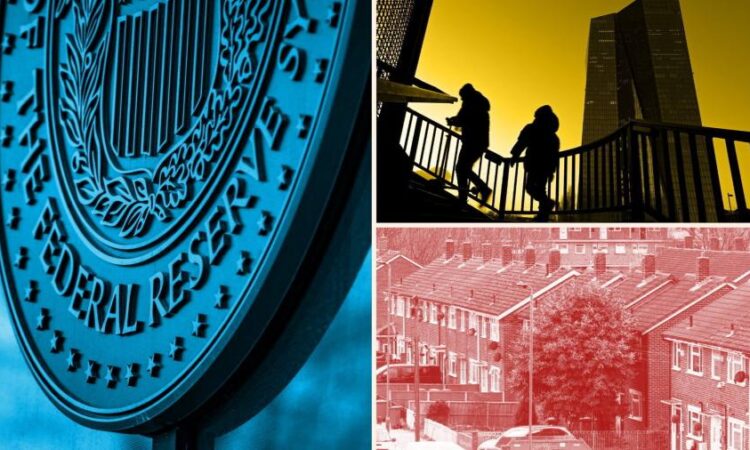
Will the Fed deliver its tenth straight rate rise?
The Federal Reserve is widely expected to raise interest rates for the tenth policy meeting in a row on Wednesday. Investors will be watching carefully for signs that the move could be the Fed’s last in its battle to tame inflation.
Consensus estimates put the Fed’s next increase at 0.25 percentage points, according to a Reuters poll, which would take rates to a range of 5 to 5.25 per cent. As recently as March last year, US borrowing costs sat close to zero.
The Fed’s campaign of aggressive interest rate rises has already started to cool rapid price growth and a hot labour market. US inflation eased in March to its lowest level in almost two years, and economists polled by Reuters expect the country to have added 178,000 jobs in April when data are released on Friday — a large step-down from 236,000 a month earlier.
Gross domestic product figures on Thursday also showed that economic growth slowed sharply in the first quarter of 2023.
Some investors believe Fed rate-setters will leave rates unchanged, following the latest flare up of tensions in the US banking sector.
But for now, most still anticipate a rise, with inflation of 5 per cent remaining well above the central bank’s 2 per cent goal. Market pricing indicates that investors expect interest rates to level off after the May meeting before falling to around 4.5 per cent by the end of the year.
“We are likely to get a final [0.25 percentage points] on May 3, followed by a pause for at least the remainder of the year,” said analysts at Rabobank. They expect Fed rate-setters to drop the language that “some additional policy firming” may be needed from their formal introductory statement. Harriet Clarfelt
What should investors expect from European inflation data?
Investors will be closely watching Tuesday’s eurozone inflation data ahead of European Central Bank’s rate-setting meeting this week, with economists expecting headline annual price rises to remain stubbornly high at 6.9 per cent for the year to April.
Inflation in the 20-country single currency zone fell for five consecutive months to March from a record high of 10.6 per cent in October, but traders are expecting the downtrend to level off following recent data showing strong services activity.
April’s inflation data, along with the central bank’s survey of lenders which will also be published this week, will influence whether the ECB raises its main interest rate by half a percentage point — as it did in March — or slows to a 0.25 percentage point rise, from its current level of 3 per cent.
Rate setters will also keep a close watch on core inflation, which excludes energy and food costs for a better view of underlying price pressures and reached a record high of 5.7 per cent in March.
Some analysts think eurozone inflation may even rise, with RBC Capital Markets expecting a headline rate of 7.1 per cent. “While the overall trend for inflation is down, in April the base effect of energy prices works to the upside, as does a rebalancing of goods weighted in the index,” said RBC economist Peter Schaffrik. Mary McDougall
Are there any positive signs for the UK housing market?
The gloom hanging over the UK housing market could be starting to lift a little, data this week is expected to show.
Economists polled by Reuters forecast that the Nationwide house price index, released on Tuesday, fell by 0.3 per cent between March and April, marking a smaller contraction than the 0.8 per cent fall registered the previous month.
However, compared with April last year, prices are still expected to be 3.6 per cent down. The annual fall was 3.1 per cent in March, the largest since 2009.
On Thursday, the Bank of England’s mortgage approvals are also forecast to show an improvement, with Investec expecting a rise to 46,000 in March from 43,500 in February. That would mark the second consecutive monthly rise after approvals reached a post-pandemic low of 39,647 in January.
Kallum Pickering, an economist at Berenberg, said that with fears of banking troubles receding and BoE interest rates expected to peak soon, “the worst of the squeeze [for homebuyers] may be over.”
He expects house prices to fall by about 6 per cent from their peak in August, which would mean a “modest” shock compared with previous estimates, “consistent with broader evidence that economic activity held up better than expected over the winter”. Pickering thinks that a strengthening economy through to 2024 will lift housing demand, starting in the second half of next year.
The BoE data will also publish consumer credit data. The consensus is that monthly credit growth was relatively stable in March at around £1.5bn. Sandra Horsfield, an economist at Investec, said that, with the ongoing cost-of-living pressures, “some households will have had little choice but to resort to unsecured borrowing to make ends meet.” Valentina Romei



